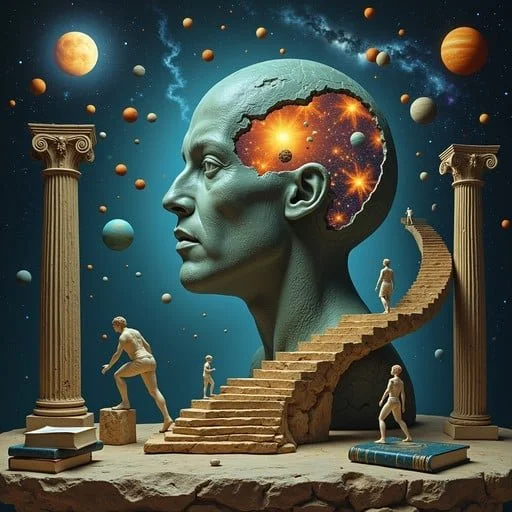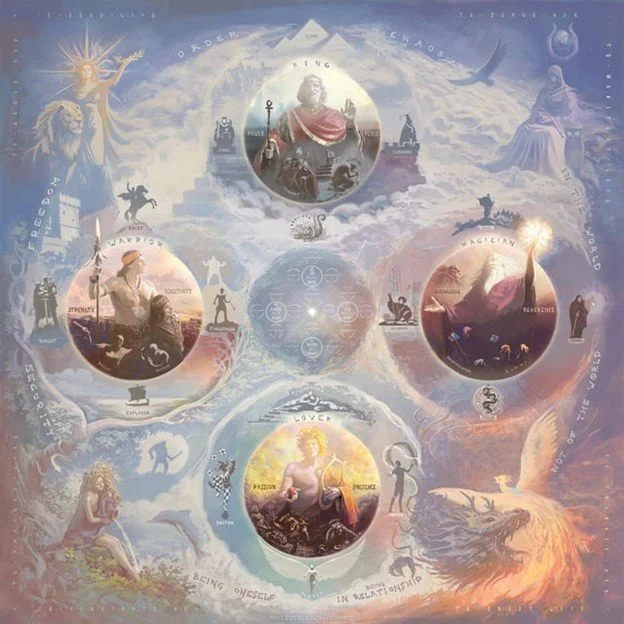“Who looks outside dreams; who looks inside awakes.” — Carl Jung
How Astrology Works
The key to understanding how astrology works is in recognizing that while astrological charts reveal our immutable archetypes, our charts are alive and change as we do. This can sound irrational at first but is actually quite true as an evolutionary process. The chart's planets, signs, and aspects each possess particular, unchanging qualities that manifest in different ways as we grow. The best example of this dynamic is our own lives. We are born with our unique identity, yet as we grow into our lives our experiences change how we see things, both past and future, and how we express ourselves. One doesn't become an entirely different person, but rather more of what one has always been. The same is true of charts: While the original structure of our personal birthchart doesn't change, as we mature the chart's features respond by revealing ever deeper layers of meaning because our perceptions have changed. In fact, astrology itself as a discipline has followed this same process. Over millennia it has evolved from its beginnings as a way the ancients tracked the stars to guide their agricultural practices, to a method used to advise monarchs wanting to influence outcomes in their realms, to its current ability to bring light and agency to our psychological world. Astrology has changed as we have evolved in our understanding of what it can reveal and thus how it can be used. What do scientists say? I worked in science for almost 40 years and had ample opportunity to experience scientists' perspectives on the topic of astrology. Most would mask their skepticism with indulgent listening, or they would counter with a common response: “It can't be proved!" The only possible answer to that was, and indeed still is: "You're absolutely right. Astrology can't be proved. Yet." Science is a brilliant endeavor but it is subject to the limitations of accepted knowledge. That very limitation can inspire the more curious and open-minded scientists, leading them to extraordinary discoveries. Yet it's worth noting that science doesn't make things real; it makes them obvious. The truth about how astrology works exists right now and is yet to be revealed until the right questions are asked by scientists. And the formulation of those questions is largely dependent on the passage of time and experience. Over the eons, what were once puzzling questions or inflexible laws have been subjected to evolving scientific enquiry, overturning accepted facts and expanding the boundaries of our understanding of what is real. I heartily agree with Albert Einstein's observation: "Opinions about obviousness are to a certain extent a function of time." All this said, most depth astrologers work from the premise that while our charts have this unique ability to both reveal and respond to our circumstance, astrology isn’t predictive. It won’t tell you who you should marry or where you should go to school, whether your mate will leave you or when your grandmother will pass away. What it will give you is greater awareness of your ability to choose how you want to engage with life. It will reveal the specific resources you were born with that you can use to navigate your experience.What is Archetypal Astrology?
Archetypes are universal, recurring patterns of human behavior and character that appear across cultures and history. The word comes from the Greek "arkhetypos", meaning "original pattern." Because archetypes are ancestral, that is, from an original root, all humans share them. Dr. Richard Tarnas, arguably the father of archetypal astrology, defines archetype as “a universal principle or force that affects, structures, and permeates the human psyche and the world of human experience. One can think of them in mythic terms as gods and goddesses.” Primitive humans lived instinctively with these “gods” and “goddesses”, experiencing the world as enchanted by unseen forces from which they took direction and comfort. This mysterious intelligence—the archetypes—exists as subtle patterns in the psyche that are often inaccessible to the logical mind but are understood by the soul. Archetypes function as storytellers that can connect soul with mind, revealing innate dynamics that we don’t normally perceive. The soul's messages can be found in the chart as planets—the archetypal gods and goddesses—that communicate in complex ways using signs, houses, and aspects. All of these combine to influence how the archetypes uniquely shape our responses. Astrology through an archetypal lens makes these stories more accessible so that we can benefit from their wisdom.Fate vs. Destiny
The Three Fates: Clotho, the spinner, Lachesis the alloter, and Atropos the cutter. John Melhuish Strudwick (1849–1935), “A Golden Thread” (1885).
“Until you make the unconscious conscious, it will direct your life and you will call it fate”. — Carl Jung
Psychologist Carl Jung's statement suggests that fate is a force within our psyche that appears to act autonomously to create events. He also clearly believed that if we become aware of our psyche’s nature and its archetypal needs, we become co-creators of our circumstance through the power of choice. Becoming aware of what motivates us changes situations from “things that happen to us”, to events over which we have sovereignty. In other words, the difference between fate and destiny is consciousness. Destiny then becomes a condition of living life in a way that allows us to create our own outcomes according to our truest nature. Viewing astrology in this way allows us to access the archetypes' tools to create our lives from our inner authority.

